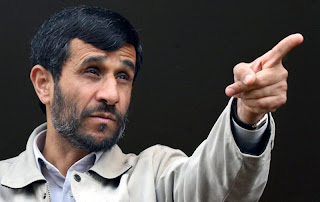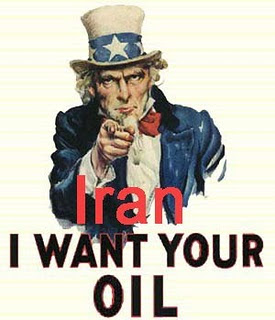
jeudi 11 mars 2010
Nuclear Power or WEAPON?
Iranian President, Mahmoud Ahmadinejad, has been negotiating with the West on providing fuel for use in a medical reactor. Iran has written a letter to the International Atomic Energy Agency informing them that they intend to enrich uranium up to 20 percent. This proposal was attractive to the West because it would deprive Iran of stockpiles that it could convert into bomb fuel, while providing Tehran with fuel rods that would be very difficult to use in a weapon. The West is saying that Iran has rejected the deal because of the sanctions that Russia, China and the US have been resisting. However, Tehran accuses the West of failing to respond to its proposals.


vendredi 12 février 2010
How globalization affected Iran politically?
Iran is not influenced by globalization politically because , its political system is mainly based on the sharia law.
Sharia law is the way that muslims should live or the path they should follow in islam. it is taken from sacred texts and tells us about islam, the qu'ran, and hadith ( messages that the prophete mohamed sent to people in order to guide them and show them the right way). many islamic countries apply it and run their country following its rules. the sharia law is very important in the religion of Islam and permits muslims to practice their religion well.
iran's political system consists of democracy and the sharia law.
Sharia law is the way that muslims should live or the path they should follow in islam. it is taken from sacred texts and tells us about islam, the qu'ran, and hadith ( messages that the prophete mohamed sent to people in order to guide them and show them the right way). many islamic countries apply it and run their country following its rules. the sharia law is very important in the religion of Islam and permits muslims to practice their religion well.
iran's political system consists of democracy and the sharia law.
jeudi 11 février 2010
How has globalization affected Iran economically?

With globalization being the intensification of worldwide interconectedness associated with the increased speed and magnitude of cross-border flows of trade, investment, and finance, and migration, cultural diffusion, and communication, Iran has formulated a law permitting foreign investment with one hundred percent ownership of any firm in the country.
In the nineteenth century, Iran became dependent on Western economy. The rush of mass-manufactured goods into Iran destroyed some of the traditional handicrafts (such as cotton textiles) due to Iran's cheap importation of local manufactured goods. British merchants encouraged Iran landowners to increase crops such as cotton and tobacco. This lead to a series of famines because of the unavailability of wheat and other edible grains. However, Iran intergrated into the world system in the twentieth century. Iran became dependent on only one commodity- oil. Iran's exportation of oil defines it's country as a rentier state (a country that has an advantageous income by exporting raw materials or natural resouces to foreign companies).
The Islamic Republic was hoping for a rapid economic development and becoming fully dependent on oil and the West. Under the Iranian Republic, Iran's oil revenues became affected not only by the war in Iraq but also its failure to raise production. In order to raise oil production, Iran needs a rush of capital and new technology that is only found in the West. This pushed the Iranian Republic to change it's policy to foreign investment. The regime that supported self-sufficiency at the time became in debt with foreign banks and governments which forced them to continue renegotiating foreign loans constantly.
In the nineteenth century, Iran became dependent on Western economy. The rush of mass-manufactured goods into Iran destroyed some of the traditional handicrafts (such as cotton textiles) due to Iran's cheap importation of local manufactured goods. British merchants encouraged Iran landowners to increase crops such as cotton and tobacco. This lead to a series of famines because of the unavailability of wheat and other edible grains. However, Iran intergrated into the world system in the twentieth century. Iran became dependent on only one commodity- oil. Iran's exportation of oil defines it's country as a rentier state (a country that has an advantageous income by exporting raw materials or natural resouces to foreign companies).
The Islamic Republic was hoping for a rapid economic development and becoming fully dependent on oil and the West. Under the Iranian Republic, Iran's oil revenues became affected not only by the war in Iraq but also its failure to raise production. In order to raise oil production, Iran needs a rush of capital and new technology that is only found in the West. This pushed the Iranian Republic to change it's policy to foreign investment. The regime that supported self-sufficiency at the time became in debt with foreign banks and governments which forced them to continue renegotiating foreign loans constantly.
Libellés :
http://www.youtube.com/watch?v=-iONhY5_YrY
How has globalization influence Iran sociocultural? ?

Globalization is the increasing of diverse economic, socio-cultural, military, and environmental phenomena by means of networks that span vast distances around the world.
Iranian culture is a mix of pre-Islamic and Islamic culture. Years ago, Iranian culture influenced western Europe, Africa, china, India, and the roman civilization. this influence played an important role in asian and european cultures nowadays, especially in the domain of art.
iran's culture is mainly influenced by Islam which is which is the dominant religion and which also influences the political system of the country.
Globalization which is a huge phenomena, didn't completely affect Iran's culture knowing that the Islamic Republic is an opponent to what they call "world arrongance" or imperialism. They refuse to be part of this phenomena which affects the world and with which many people lost their vision and affection for their own country, or culture.

Iranian culture which has also been influenced by persian civilization and spirit has evoluate in the domain of art considered as the richest art heritages in the world, it has also thousands years of history when it concerns music. Iranian music has developed its own pop music in te 1950's, when Vigen has introduced guitar for the first time and later on used instruments. Iranian hip-hop, rap, and rock music has been influnced by many tradditional forms of music and popular western music.
Iran's cinematographic industry has won 300 international awards in the past 25 years.
Its architecture has a continuous history from at least 5000 BCE to the present, its cuisine includes tradditional food such as kabaab, dolmeh, and cotlet, there are also fast foods and restaurants serving pizzas, hamburgers, and other kinds of food that have been influenced by amercian cuisine which spreads around the world.
Many sports are practiced in iran such as soccer and freestyle wrestling, and the most speaken languages are persian, kudisha and balochi which are western iranian languages, and pashto which is an eastern iranian language.
Globalization doesn't have a very important impact on irans' social life which is mainly based on Islam and its practices. Many of its cultural aspects have also been influenced by the dominant religion even if in iranian music, especially rap, hip-hop, and rock music, we can notice influence from the western music.

socially - the advent of global environmental challenges that might be solved with international cooperation, such as climate change, cross-boundary water and air pollution, over-fishing of the ocean, and the spread of invasive species. Since many factories are built in developing countries with less environmental regulation, globalism and free trade may increase pollution. On the other hand, economic development historically required a "dirty" industrial stage, and it is argued that developing countries should not, via regulation, be prohibited from increasing their standard of living.
Inscription à :
Articles (Atom)